Hosepipe ban: How do allotments and greenhouses survive?
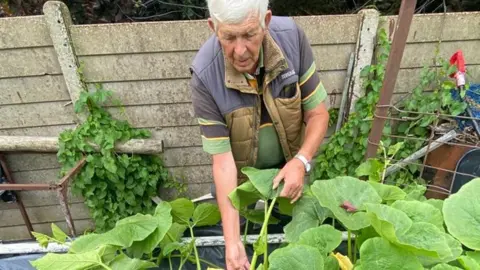 Terry Walton
Terry Walton"Don't tease them."
This is the simple message from gardening guru Terry Walton for helping your plants and vegetables survive a potential hosepipe ban.
Restrictions start in Pembrokeshire and part of Carmarthenshire later this month after a summer that has seen less rain than usual.
With many new gardeners taking on allotments during the pandemic, some are wondering if their peas, beans, radishes and spring onions will wilt.
With Wales experiencing a heatwave in July which saw the hottest day ever and rainfall at 60% of its usual average between March and May, Welsh Water announced a hosepipe ban on Thursday.
It will cover Pembrokeshire and a small part of Carmarthenshire, starting on 19 August.
Mr Walton, 76, who shares tips on BBC Radio 2, said if you are limited on water, you have to be selective over which ones you look after and can "sacrifice" potatoes.
"Things like tomatoes, cucumbers and peppers in greenhouses, if you have one, have to be watered at least once a day," he said.
"But don't just spray water from a can over them - pour it heavily to the root.
"Don't tease them. If roots sense moisture and they come up to find dry soil, they will die."
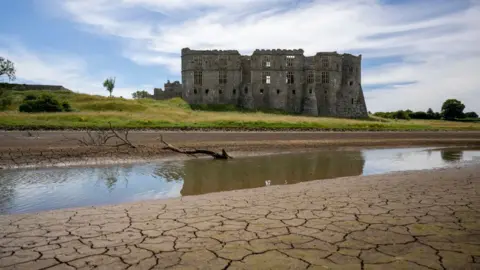 Getty Images/Matthew Horwood
Getty Images/Matthew HorwoodWelsh Water is under pressure to maintain supplies and the ban means people will not be allowed to water their plants, wash their cars or clean windows using a hose.
The company said the planned ban would be its first since 1989 and follows similar action announced for parts of southern England.
It will be a concern for new allotment owners - demand soared during lockdown, partly because of empty supermarket shelves and concerns about food supplies.
Social Farms and Gardens is creating 600 new plots in Wales and the charity's Anne-Marie Pope said we will increasingly rely on allotments to fill for our fridges, adding: "Growing your own is core local food security."
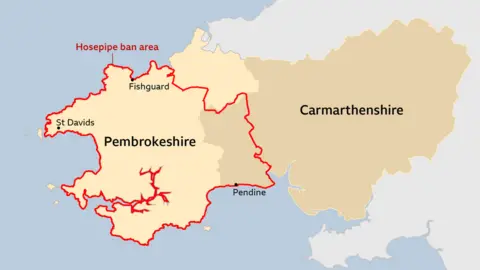
The good news from Mr Walton is, by being selective, "we shouldn't have a problem in this part of the world" with hot weather or hosepipe bans.
Roots of carrots, parsnips and beetroot are now eight or nine inches deep, down into moisture, so they could survive potentially for months with no rain, he said.
While peas, beans, lettuce, spring onion and radish still need "a good soaking", but you can get away with doing it every three or four days.
Mr Walton, who lives in Tonyrefail and has an allotment in Llwynypia, Rhondda Cynon Taf, added: "Potatoes (planted in April) are coming to the end of their career anyway, you can sacrifice these, dry them and sack them up for the autumn and winter."
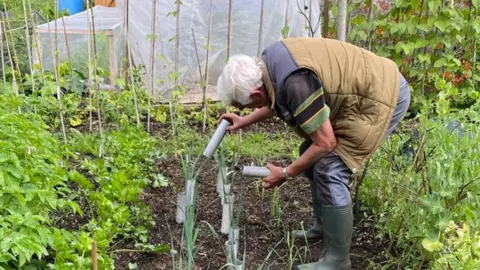 Terry Walton
Terry WaltonIn fact, he believes after being planted at a time when it was cool and dry and the ground moist, a dry August could be the ideal time to pick them anyway.
Mr Walton, who has been gardening since 1957, said the situation is "nowhere near as bad" as 1976, when "everything dried up".
Two days of rain earlier this week means he has 10 barrels full of water that should last until the end of August.
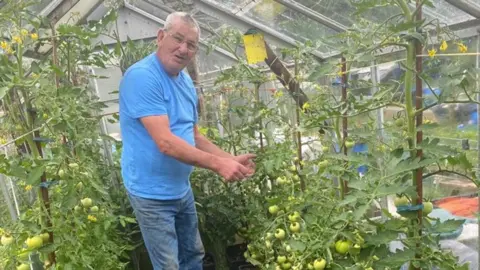 Terry Walton
Terry WaltonHe has a cascade system which fill them from water running off the roofs of his shed and greenhouses.
"I've seen a lot worse summers - two weeks of extreme weather is difficult, but we've had two or three days," he said.
"Most veg can't stand being over 30 degrees too long, 20 to 25 they're built for. But when it's warmer and sunnier, runner beans, carrots, peas and spuds are doing well.
"But I'd rather a dry July and August than May and June."
What about garden plants?
Welsh Water Chief Executive Peter Perry said: "Please use things like watering cans to water plants.
"Don't use hosepipes to fill swimming pools and hot tubs or any other kind of facility in the garden.
"Please use the watering can, we know that drives down the amount of water people use."
He added "if we all made a five or ten litre contribution" on top of the ban "we will get through this is pretty challenging period".

- WONDERS OF THE CELTIC DEEP: Encounter mythical coasts and extraordinary creatures
- IOLO: A WILD LIFE: Iolo delves into the archives from the past 25 years

